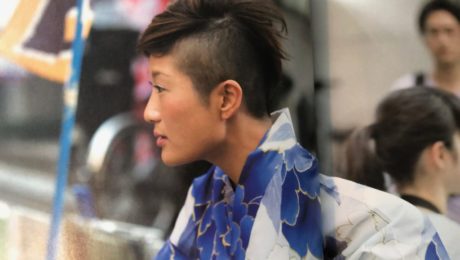
‘I would rather be hated for who I am, than loved for who I am not’ is what I read on a T-shirt worn by a teenage girl in Tokyo, who passed me by on a train platform. In a high-end department store I saw decorative items and posters for girls’ rooms saying ‘Space where I can be myself’.
Are these the changes in modern Japan that I was expected to see? I was always fascinated with the Japanese concepts of Honne and Tatemae – honne are a person’s true feelings and desires (本音 hon’ne, “true sound”), and tatemae are the behaviour and opinions one displays in public (建前tatemae, “built in front”, “façade”).
As a fairly straightforward, yet Diplomatic ‘Westerner’, I often found this discrepancy bothered me, though I tried to withhold judgement as this honne-tatemae divide is considered to be of paramount importance in the Japanese society, culture and social norms.
While at some level I was happy and intrigued to read the inscription on the girl’s T-shirt, it brought down the realisation to me — there is a below the surface belief there that we will be hated and not accepted for who we are. That is the first half of this statement, the grounding statement.
Whether being accepted, fitting in and almost blending into the environment is a norm like in Japan, or not, like in most Western cultures, deep down, we all want to be accepted — this comes from one of our deepest human needs — to belong.
I personally struggled with that, and still do. I am often criticised by my children for not feeling more allegiance to my home country Serbia. Having gone to Japan at the age of 24 to live and work, significant parts of my persona were affected by their value system. While some values I recognised as intrinsically my own and I found them present in Japan much more so than in my home country — such as meritocracy, commitment, dedication, hard work, loyalty, orderliness, sense of contribution to the whole, some others, like honne-tatemae I found really difficult. The need for full freedom of self-expression and the ‘pursuit of truth’ (whatever that may be for me) aligned much better with an individualistic society, such as Britain’s, than a strongly collectively oriented Japan.
Back to the sense of belonging. So….While at the same time I rebelled against this ‘collective oppression to fit in’ and be part of the group, I also felt very touched by the beautiful examples of co-ordination, unity and collective effort presented in Japanese festivals, traditional dances, or even morning exercises done in a group. A sense of flow in unison where a new quality is born when every little part does exactly as they are supposed to – in order to create something bigger and more beautiful than just the sum of all parts…that felt like belonging. But I could only observe it from the distance, not be part of it.
So eventually, what do I do with this mixture — of hot-headed, deep-feeling, rebellious Southern-Eastern Europe mentality, subtlety and depth of Zen philosophy and Haiku poetry (which first attracted me to study Japanese) and dynamic, let’s do it, individualistic approach of the Anglo-Saxon model of being and doing?
I guess I just let it be. I marvel at various parts of myself, discovered and yet to be discovered. Shaped by external influences and cultures I lived in as well as by my own inner, deeper value systems and beliefs, I dance with all those various facets and aspects of me, not looking for any ‘secret sauce’ for happiness. To me, it is in finding a balance between who you truly are and who you want to be, as well as who you are expected to be (going back to honne and tatemae). At points in time when these aspects overlap and coincide, we are in flow and happy and everything seems to be going well. At other times, things stall or come to a grinding halt, or they simply disintegrate. Observing yourself and all of it, is a fine art. And then ask yourself (I recommended this to a client who struggles to separate authentic desires from people pleasing, especially the internalised voices of his parents) — “Who am I making happy with this choice?” See what answer you get. You may not like it, or you may not get an answer. But if you don’t even ask….How will you know?

